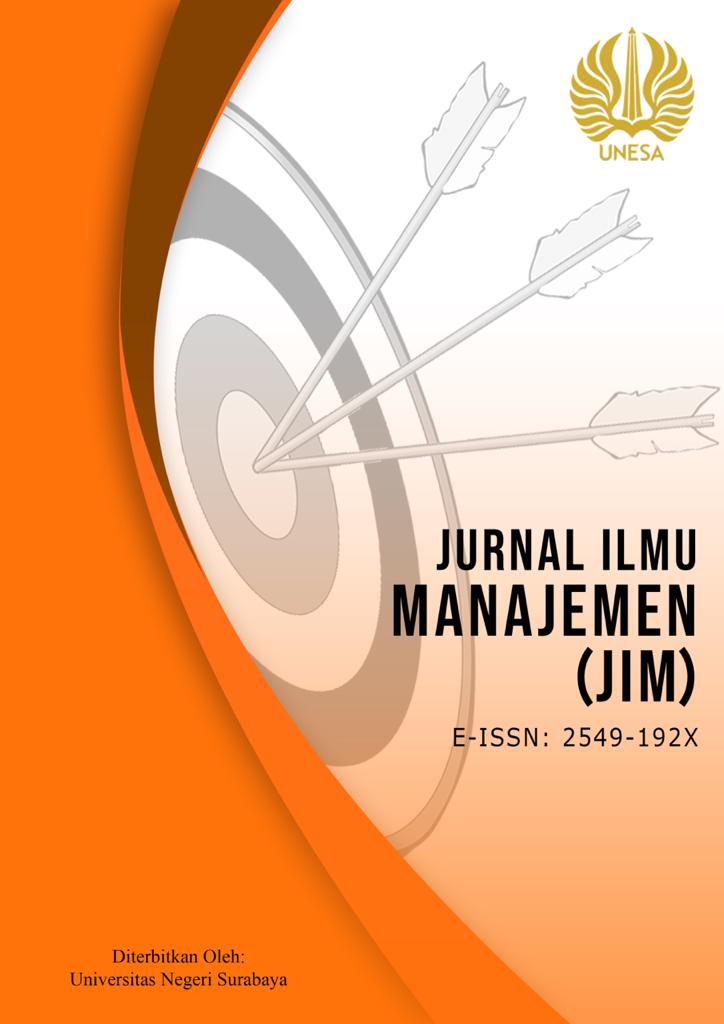Determinan kinerja karyawan kementerian keuangan dengan budaya kaizen sebagai moderator
DOI:
https://doi.org/10.26740/jim.v12n2.p301-314Keywords:
employee performance, empowering leadership, kaizen culture, path analysis, work engagementAbstract
This study aims to determine the effect of leadership empowerment and work engagement moderated by kaizen culture on employee performance within the Secretariat General of the Ministry of Finance of Indonesia. This research is a quantitative study with an explanatory survey approach. Respondents in this study amounted to 180 people from a total population of 221 people determined using the Isaac and Michael method and cluster random sampling technique because respondents were spread across several fields. The data management technique in this study uses path analysis. Work engagement moderated by kaizen culture has a significant positive impact both partially and simultaneously on the performance of employees of the Secretariat General of the Ministry of Finance. In addition, leadership empowerment moderated by kaizen culture has no significant impact on employee performance. The relationship between leadership empowerment and work engagement with employee performance among Ministry of Finance employees is direct and positive, meaning that an increase in leadership empowerment and work engagement will improve employee performance. In addition, an increase in work engagement moderated by kaizen culture will improve the performance of Ministry of Finance employees
References
Byars, L. L., & Rue, L. W. (1984). Human Resource and Personal Management. Homewood.
Gibson, J. L., Ivancevich, J. M., Donnelly, J. H., & Konopaske, R. (2012). Organizations: Behavior, Structure, Processes. McGraw-Hill.
Heizer, J., Render, B., & Munson, C. (2018). Operations Management : Sustainability and Supply Chain Management. In Supply Chain Management (12th ed.). Pearson Education Ltd.
Hu, B., Hou, Z., Mak, M. C. K., Xu, S. L., Yang, X., Hu, T., Qiu, Y., & Wen, Y. (2019). Work engagement, tenure, and external opportunities moderate perceived high-performance work systems and affective commitment. Social Behavior and Personality, 47(5). https://doi.org/10.2224/sbp.7353
Imai, M. (2008). The Kaizen Power. Think.
Keputusan Menteri Keuangan Nomor 127/KMK.01/2013 tentang Program Budaya di Lingkungan Kementerian Keuangan Tahun 2013, (2013).
Kementerian Keuangan Republik Indonesia. (2019). Ministry of Finance Organizational Fitness Index.
Mathis, R. L., & Jackson, J. H. (2009). Manajemen Sumber Daya Manusia. Penerbit Salemba Empat.
Milkovich, G. T., & Boudreau, J. W. (1997). Human Resource Management. Irwin.
Mucheru, A. M. (2013). Effects Of Kaizen Tool On Organization Effectiveness: A Case Of Davis&shirtliff Ltd. University of London.
Surat Edaran Menteri Keuangan Republik Indonesia Nomor SE-8/MK.1/2022 tentang Pengelolaan Kinerja Pegawai Aparatur Sipil Negari (ASN) Semester I Tahun 2022 di Lingkungan Kementerian Keuangan, (2022).
Vuong, B. N., & Hieu, V. T. (2022). The effect of empowering leadership on job performance among frontline employees: does power distance orientation matter? Journal of Organizational Effectiveness. https://doi.org/10.1108/JOEPP-11-2021-0333
Downloads
Published
How to Cite
Issue
Section
License

This work is licensed under a Creative Commons Attribution-NonCommercial 4.0 International License.
 Abstract views: 1022
,
Abstract views: 1022
, PDF Downloads: 313
PDF Downloads: 313











